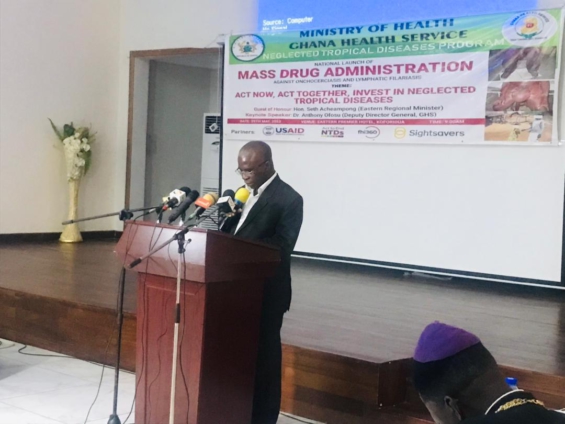The Ghana Health Service (GHS) has initiated mass drug administration against Neglected Tropical Diseases (NTDs), with the goal of administering drugs in endemic districts.
The Mass Drug Administration (MDA) is a measure towards the eradication of NTDs by 2030, specifically onchocerciasis and lymphatic filariasis (LF).
The MDA exercise would take place in 76 onco-endemic districts with a target population of approximately 5.4 million individuals and seven Lymphatic Filariasis-endemic districts with a target population of approximately 400,000 individuals.
During the 2023 national launch in Koforidua, Dr Anthony Adofo Ofosu, Deputy Director-General of GHS, said in 2022, the GHS NTD Programme, with the support of stakeholders, achieved 83.8 percent treatment coverage for lymphatic filariasis, and 84.2 percent and 83.4 percent treatment coverage for onchocerciasis in the first and second treatment rounds, respectively.
He said onchocerciasis, also known as river blindness, and lymphatic filariasis, also known as elephantiasis, can be treated with a highly effective integrated community treatment approach utilising drugs that have been shown to be safe and effective and can be administered by trained non-health personnel.
He said preventing and controlling NTDs was essential to ending acute poverty within the next two decades.
"This approach, MDA, gives a single dose of medication once or twice a year to everyone who qualifies," he said.
"When MDA is used for three to seven years, the burden of NTDs can be greatly reduced and, in some cases, completely eliminated."
Director of Administration at the Eastern Regional Coordinating Council, Madam Stella Panwum who spoke on behalf of Mr. Seth Acheampong, the Eastern Regional Minister, said mass drug administration, morbidity control and management and health education in endemic districts have yielded positive results, and that additional action was required to end the transmission of NTDs by 2030.
She said in a few months, the national programme will also examine schistosomiasis (Bilharzia) and intestinal worm infestation among school-age children.
Madam Panwum said due to the use of placid water for vegetable cultivation and as children swim in riverbeds the region was highly conducive to the transmission of NTDs.
She said the Kwahu Afram Plains North, Kwahu Afram Plains South, and Kwahu East districts would be targeted as endemic districts.
According to Dr. Felicia Owusu Antwi, a WHO representative, mass medication administration is the most recommended strategy for halting the spread of NTDs related to chemotherapy and must be supported to demonstrate the intended effect.
WHO has provided support for onchocerciasis and other NTDs related to chemotherapy throughout Africa, particularly in Ghana.
She said as part of efforts to accelerate the eradication of NTDs, "This support has primarily consisted of financial and operational assistance such as mapping the disease burden, delivery of medicines, and supply chain management to countries including Ghana."
To enhance the content of MDAs, she suggested that the use of technology in data acquisition should be bolstered.
She said the communities must be equipped with pertinent health information so that they can take the necessary measures towards behaviour modification.
Project Director of USAID's Act to End NTDs-West Programme, Mrs. Irene Dzathor said 108 out of 116 endemic districts for lymphatic filariasis and onchocerciasis in Ghana have accomplished a remarkable interruption of transmission.
She said MDA transmission assessments are being conducted in 61 out of 137 endemic districts.
Mrs. Dzathor said the Act to End-WEST Programme is dedicated to assisting the Ghana Health Service.
She said, "We are willing to provide financial support and technical assistance so that by 2030, onchocerciasis and Lymphatic Filariasis are no longer public health concerns in Ghana."
"The USAID Act to End NTDs—West Programme will continue to support Ghana government and other stakeholders in ensuring that all populations at risk for NTDs, particularly onchocerciasis, lymphatic filariasis, and other chemotherapy-related NTDs, have access to preventive treatment therapy," she said.
Latest Stories
-
Clear and strong climate policies are antidote to economic uncertainty – UN Climate Chief
7 minutes -
Journalism has become politicised and cheap – KSM laments
13 minutes -
Climate Education reaches differently-abled children at Garden City Special School
15 minutes -
Mahama’s remarks on Cedi vindicate NPP’s economic legacy – Minority
24 minutes -
I lied about having radio experience to get hired – KSM
29 minutes -
NLC direct University Senior Staff Association to call off strike
31 minutes -
Shelters in crisis: Calls grow for gov’t support as caregivers struggle to protect vulnerable children
33 minutes -
Black Sherif set for electrifying performance on COLORSxSTUDIOS on May 22
37 minutes -
Ghana Card blocks prison graduates from National Service – Inmates appeal to Parliament to intervene
40 minutes -
Richard Ndignan: United States of Africa – A call for continental rebirth and unity
1 hour -
Hoefman Laboratories boosts maternal care at Ridge Hospital with equipment donation
1 hour -
One in three babies born to HIV-positive mothers at risk of toxoplasmosis, KNUST study reveals
2 hours -
Erroneous to think my role as Torkornoo’s lawyer in injunction application against probe affect optics – Godfred Dame
2 hours -
Suspened CJ Torkornoo is merely barking – Ansa-Asare on injunction to stop removal probe
2 hours -
Ghana Athletics sets roadmap for junior and senior athletes ahead of August nationals
2 hours

